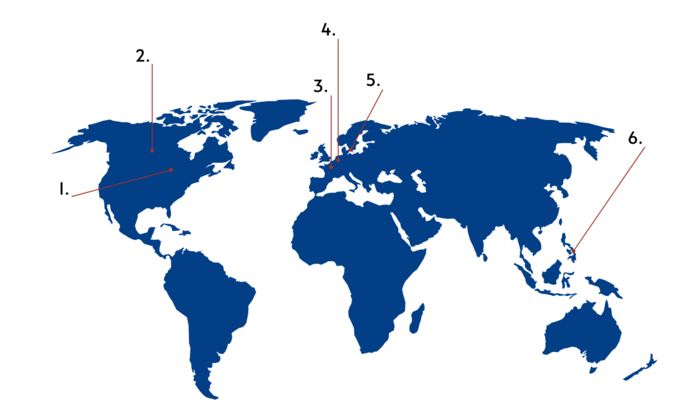Subject Area and Research Team: II. Cardiovascular regulation in health and disease
Research topics
1. Role of sympathetic nervous system in development and progression of cardiovascular disease
2. Cardiorespiratory coupling in health and disease
3. Blood-brain barrier in health and disease
4. Brain perfusion, function and structure – impact of exercise and hypertension
5. Environmental (hyperbaric) neuropsychology
6. Iron metabolism
Coordinators
| Coordinator #1 | Coordinator #2 | |
|---|---|---|
| Name and surname |  |
 |
| Academic degree | Prof. Dr. Habil. | Prof. Dr. Habil. |
| Employment unit | Department of Hypertension and Diabetology | Department of Human Physiology |
| Polish Platform of Medical Research | Prof. Dr. Habil. Krzysztof Narkiewicz | Prof. Dr. Habil. Paweł Winklewski |
| krzysztof.narkiewicz@gumed.edu.pl | pawel.winklewski@gumed.edu.pl | |
| Phone number | +48 58 34 925 27 | +48 58 34 915 15 |
photos Paweł Sudara/MUG
Team Members II. Cardiovascular regulation in health and disease
Team Members: II. Cardiovascular regulation in health and disease (180 KB)Feel free to contact one of our coordinators to join our Research Team.
Key current projects
1. Alterations in breathing pattern and cardiorespiratory coupling as a novel mechanism leading to autonomic imbalance in cardiovascular diseases
2. Hypertension and cerebrovascular dysfunction
3. Effect of therapy with selective serotonin reuptake inhibitors and physical exercise on blood brain barrier permeability, selected brain neurotransmitters, kinurenine pathway and mood in major depressive disorder
4. Impact of exercise training on structural and functional brain changes among the elderly
5. Effect of hyperbaric environment on cognition
6. Changes in iron metabolism and vitamin D induced by physical exercise
Key grants
| Funding agency/grant numer | Title of the project | Years | |
|---|---|---|---|
| 1. | NCN MAESTRO | Hypertension and cerebrovascular dysfunction | 2013-2018 |
| 2. | NCN OPUS | Alterations in breathing pattern and cardiorespiratory coupling as a novel mechanism leading to autonomic imbalance in cardiovascular diseases | 2019-2022 |
| 3. | NCN OPUS | The impact of aerobic and resistance interval training on structural as well as functional brain changes among the elderly – the role of myokines, cytokines and trophic factors | 2020-2023 |
| 4. | NCN PRELUDIUM | Effect of therapy with selective serotonin reuptake inhibitors and physical exercise on blood brain barrier permeability, selected neurotransmitters in prefrontal cortex and hippocampus, kinurenine pathway and mood in major depressive disorder | 2020-2023 |
International cooperation
| Foreign partner (unit name) | Principal investigator(s) | Area of cooperation | |
|---|---|---|---|
| 1. | Mayo Clinics, Rochester, USA | Virend K. Somers | Sympathetic neural mechanisms |
| 2. | Faculty of Kinesiology and Health Studies, University of Regina, Canada | Prof. Patrick Neary | Hypobaric hypoxia and brain oxygenation |
| 3. | INSERM, Paris, France | Pierre Boutoyrie/Stephane Laurent | Early vascular aging |
| 4. | University of Leuven, Leuven, Belgium | Jan Staessen | Population-based studies |
| 5. | University of Lund, Sweden | Olle Melander/Peter Nilsson | Novel cardiovascular risk factors |
| 6. | Laboratory of Exercise Biochemistry and Neuroendocrinology Advanced Research Initiative for Human High Performance Faculty of Sports and Health and Sports Sciences University of Tsukuba, Japan | Prof. Hideaki Soya | Exercise, brain oxygenation and cognition |

Key publications
1. Małkiewicz MA, Szarmach A, Sabisz A, Cubała WJ, Szurowska E, Winklewski PJ. Blood-brain barrier permeability and physical exercise. J Neuroinflammation. 2019;16:15.
2. Winklewski PJ, Wolf J, Gruszecki M, Wszedybyl-Winklewska M, Narkiewicz K. Current understanding of the effects of inspiratory resistance on the interactions between systemic blood pressure, cerebral perfusion, intracranial pressure, and cerebrospinal fluid dynamics. J Appl Physiol. 2019;127:1206-1214.
3. Wszedybyl-Winklewska M, Wolf J, Szarmach A, Winklewski PJ, Szurowska E, Narkiewicz K. Central sympathetic nervous system reinforcement in obstructive sleep apnoea. Sleep Med Rev. 2018;39:143-154.
4. Winklewski PJ, Sabisz A, Naumczyk P, Jodzio K, Szurowska E, Szarmach A. Understanding the Physiopathology Behind Axial and Radial Diffusivity Changes-What Do We Know? Front Neurol. 2018;9:92.
5. Hering D, Kucharska W, Chrostowska M, Narkiewicz K. Age-dependent sympathetic neural responses to ß1 selective beta-blockade in untreated hypertension-related tachycardia. Blood Press. 2018 ; 27: 158-165.
6. Naumczyk P, Sabisz A, Witkowska M, Graff B, Jodzio K, Gąsecki D, Szurowska E, Narkiewicz K. Compensatory functional reorganization may precede hypertension-related brain damage and cognitive decline: a functional magnetic resonance imaging study. J Hypertens. 2017; 35:1252-1262.